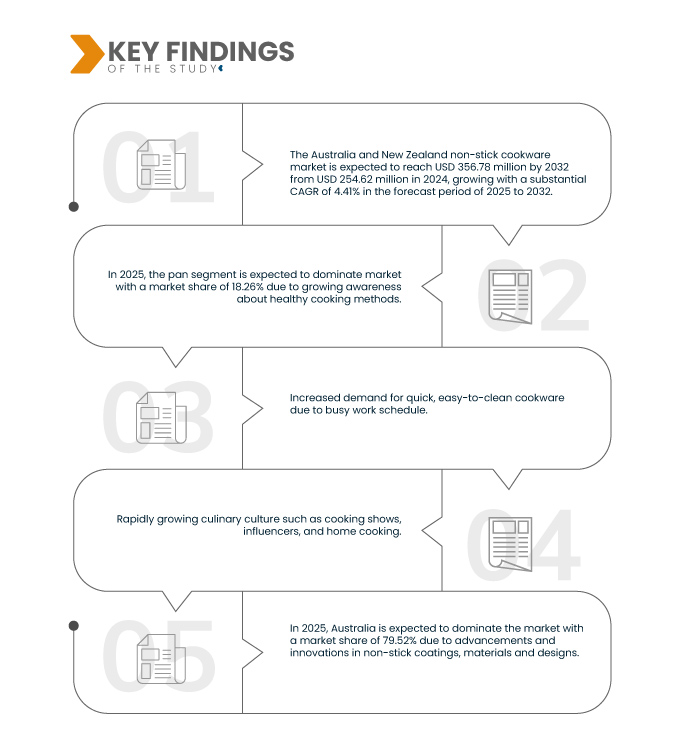消費者越來越重視健康的生活方式,這極大地推動了澳洲和紐西蘭市場對不沾鍋的需求。隨著人們越來越意識到過量食用油的健康風險,現代消費者正在尋求能夠低脂烹飪的炊具解決方案。不沾鍋具能夠減少或消除對食用油或奶油的需求,與這一日益增長的趨勢完美契合,成為注重健康的家庭的首選。受社交媒體、健康烹飪節目以及推廣營養食譜的線上內容的影響,健康烹飪實踐的激增得到了進一步的放大。這些平台經常強調不沾鍋在準備食物時保留營養價值並減少卡路里攝取量的優勢。因此,這類炊具在不同人口群體中得到了廣泛的應用,從年輕的專業人士到重視健康飲食習慣的家庭。此外,這些地區領先的炊具品牌不斷擴大以健康為導向的產品組合,也推動了市場的成長。製造商正在創新環保、無毒、不沾塗層,例如陶瓷或不含 PFOA 的塗層,這引起了有環保意識的消費者的共鳴。對安全和永續性的承諾不僅增強了消費者的信任,也符合該地區對綠色和道德消費日益增長的重視。
訪問完整報告 @ https://www.databridgemarketresearch.com/reports/australia-and-new-zealand-non-stick-cookware-market
Data Bridge 市場研究分析顯示,澳洲和紐西蘭不沾鍋市場規模預計將從 2024 年的 2.5462 億美元增至 2032 年的 3.5678 億美元,在 2025 年至 2032 年的預測期內,複合年增長率將達到 4.41%。
研究的主要發現
由於工作繁忙,對快速、易清潔炊具的需求增加
快節奏的生活方式和緊張的工作日程日益盛行,推動了澳洲和紐西蘭對不沾鍋具的需求。由於很大一部分人需要兼顧工作、家庭責任和個人承諾,消費者越來越重視能夠簡化備餐和清理工作的廚房產品。不沾鍋具的設計使其易於取出食物,且清潔工作量最小,正成為時間緊迫的家庭的首選解決方案。隨著雙收入家庭和城市職業人士尋求優化時間安排,不沾鍋提供的便利性已成為重要的購買動機。它能夠減少食物殘渣並防止粘連,省去了擦洗和浸泡的麻煩,對於注重效率的消費者來說尤其有吸引力。該產品相容於炒、煎等快速烹飪技術,進一步增強了它對那些希望以最少的努力準備飯菜的忙碌人士的吸引力。
報告範圍和市場細分
報告指標
|
細節
|
預測期
|
2025年至2032年
|
基準年
|
2024
|
歷史歲月
|
2018-2023(可自訂為2013-2017)
|
定量單位
|
收入(百萬美元)
|
涵蓋的領域
|
產品(平底鍋、鍋子、烤盤、壓力鍋、長柄平底鍋、方形烤架、烤盤、荷蘭烤箱、麵包烤盤、三明治烤麵包機、炒鍋、煮蛋器等)、原料(基材和塗層)、塗層層(三層、雙層和單層)、分銷渠道(超市/大賣場、電子商務、餐具商店等)、最終用戶(住宅和商業)
|
覆蓋國家
|
澳洲和紐西蘭
|
涵蓋的市場參與者
|
Cuisinart - Conair Australia(澳洲)、Scanpan Australia(丹麥)、Tefal(法國)、SOLIDTEKNICS PTY LTD。 (澳洲)、Made In(美國)、GreenPan Australia(澳洲)和 Biome(澳洲)等。
|
報告涵蓋的數據點
|
除了對市場價值、成長率、細分、地理覆蓋範圍和主要參與者等市場情景的洞察之外,Data Bridge Market Research 策劃的市場報告還包括深入的專家分析、定價分析、品牌份額分析、消費者調查、人口統計分析、供應鏈分析、價值鏈分析、原材料/消耗品概述、供應商選擇標準、PESTLE 分析、波特分析和監管框架。
|
細分分析
澳洲和紐西蘭不沾鍋市場根據產品、原材料、塗層、分銷管道和最終用戶分為五個顯著的部分。
- 根據產品,市場細分為平底鍋、鍋子、烤盤、壓力鍋、煎鍋、方形烤架、烤盤、荷蘭烤箱、麵包罐、三明治烤麵包機、炒鍋、煮蛋器等
預計到 2025 年,平底鍋將主導澳洲和紐西蘭的不沾鍋具市場
到 2025 年,由於平底鍋在煎、炒、煸等日常烹飪中的用途廣泛,預計將佔據 18.26% 的市場份額,佔據市場主導地位。消費者越來越喜歡不沾鍋,因為它可以用最少的油烹飪食物,這與該地區日益增長的健康意識趨勢一致。此外,不沾鍋易於清潔、節省時間的特性使其在忙碌的家庭中非常受歡迎。
- 根據原料,市場分為基材和塗層
預計到 2025 年,基材部分將主導澳洲和紐西蘭不沾鍋具市場
到 2025 年,由於基材在決定炊具的耐用性、導熱性和整體性能方面發揮關鍵作用,預計將佔據市場主導地位,市場份額為 53.41%。鋁和不銹鋼等基材為不沾鍋提供了結構基礎,確保均勻的熱量分佈和抗翹曲。這些材料也因其與包括電磁爐在內的各種爐灶類型的兼容性而受到廣泛青睞。
- 根據塗層層數,市場分為三層、雙層和單層。預計到 2025 年,三層市場將佔據主導地位,市佔率為 66.14%
- 根據分銷管道,市場細分為超市/大賣場、電子商務、器具店和其他。 2025 年,超市/大賣場預計將佔據市場主導地位,市佔率為 36.65%
- 根據最終用戶,市場分為住宅市場和商業市場。到 2025 年,住宅市場預計將佔據主導地位,市佔率達到 57.65%
主要參與者
Data Bridge Market Research 分析了 Cuisinart - Conair Australia(澳洲)、Scanpan Australia(丹麥)、Tefal(法國)、SOLIDTEKNICS PTY LTD。 (澳洲)和(美國)等是市場的主要參與者。
有關 澳洲和紐西蘭不沾鍋具市場報告的更多詳細信息,請點擊此處 - https://www.databridgemarketresearch.com/reports/australia-and-new-zealand-non-stick-cookware-market












